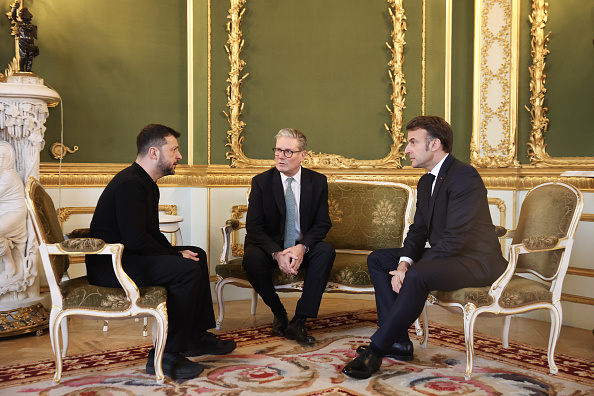France pledged 2 billion euros in military aid to Ukraine as some 30 leaders met with President Volodymyr Zelenskiy in Paris on Thursday to discuss how to strengthen Kyiv’s position and assess how they could play a role if a peace deal is struck with Russia.
The third summit of what France and Britain have called the “coalition of the willing” brings together the likes of British Prime Minister Keir Starmer, NATO Secretary General Mark Rutte, Polish Prime Minister Donald Tusk, Italian Prime Minister Giorgia Meloni and Turkish Vice President Cevdet Yılmaz.
It is taking place after Zelenskiy agreed earlier this month to proceed with ceasefire talks to ensure a resumption of U.S. aid and intelligence sharing. But Russia has placed additional demands on implementation of a ceasefire deal in the Black Sea and on energy targets, and many European nations believe a peace accord remains distant.
“First and foremost (we will discuss) the immediate support for Ukraine. It must go on because it is necessary to continue the resistance,” President Emmanuel Macron told reporters on Wednesday evening at a press conference with Zelenskiy.
Macron committed to a further 2 billion euros in French military support, including missiles, warplanes and air defence equipment. Zelenskiy said other partners could announce aid packages on Thursday.
The format aims to forge a role for Europe in any talks on ending the conflict. While the United States is not present, French officials say the outcome of the summit will be shared with the U.S. administration.
The discussions will focus on how to strengthen Ukraine militarily to deter future attacks, and how to monitor the limited ceasefires over sea targets and energy infrastructure, as discussed at U.S.-led talks this week in Saudi Arabia.
European efforts, led by Macron and Starmer, to create security arrangements for Ukraine are shifting from sending troops to considering alternatives as they face political and logistical constraints, and the prospect of Russia and the United States opposing their plans, officials have told Reuters.
“The Prime Minister will underline that all must come together to support Ukraine to remain in the fight and back US efforts to make real progress despite continued Russian obfuscation,” Starmer’s office said in a statement.
Planning so far has looked at the full range of European military capabilities including aircraft, tanks, troops, intelligence and logistics. Discussions have centred on what European nations can contribute to support any future force, it said.
REASSURANCE FORCE
An outline document for Thursday’s summit seen by Reuters refers to a possible future “reassurance force” in Ukraine away from the front line “as part of a future peace settlement and with support of the United States”.
Such a force positioned in Ukraine would aim to offer security guarantees and deter future aggression from Russia.
“The objective is to allow Ukraine to keep the situation on the ground and resist the Russian aggression, while building the credible elements to this lasting peace,” Macron said.
Zelenskiy said he hoped there would be more clarity on which countries would eventually commit to such a force, while acknowledging that it was not simple and was early in the process.
Highlighting different views among Ukraine’s partners, Italian Foreign Minister Antonio Tajani reiterated his country’s opposition to any such force.
“Not sending troops on a mission unless they are part of the United Nations, (this) is the only condition for us to deploy military personnel” in Ukraine, Tajani said after a cabinet meeting on Wednesday evening.
Russian Foreign Ministry spokeswoman Maria Zakharova accused France and Britain on Thursday of hatching plans for “military intervention in Ukraine” under the guise of a peacekeeping mission, adding such an intervention could lead to a direct military clash between Russia and NATO.
(Reuters)




















